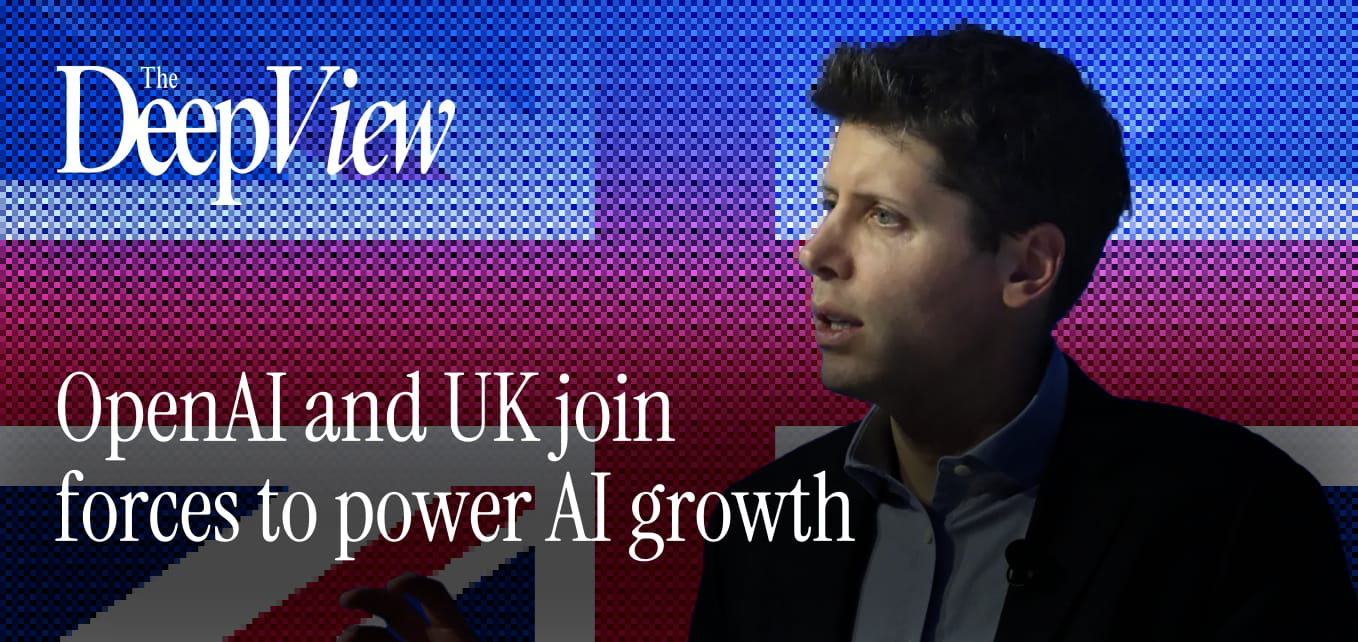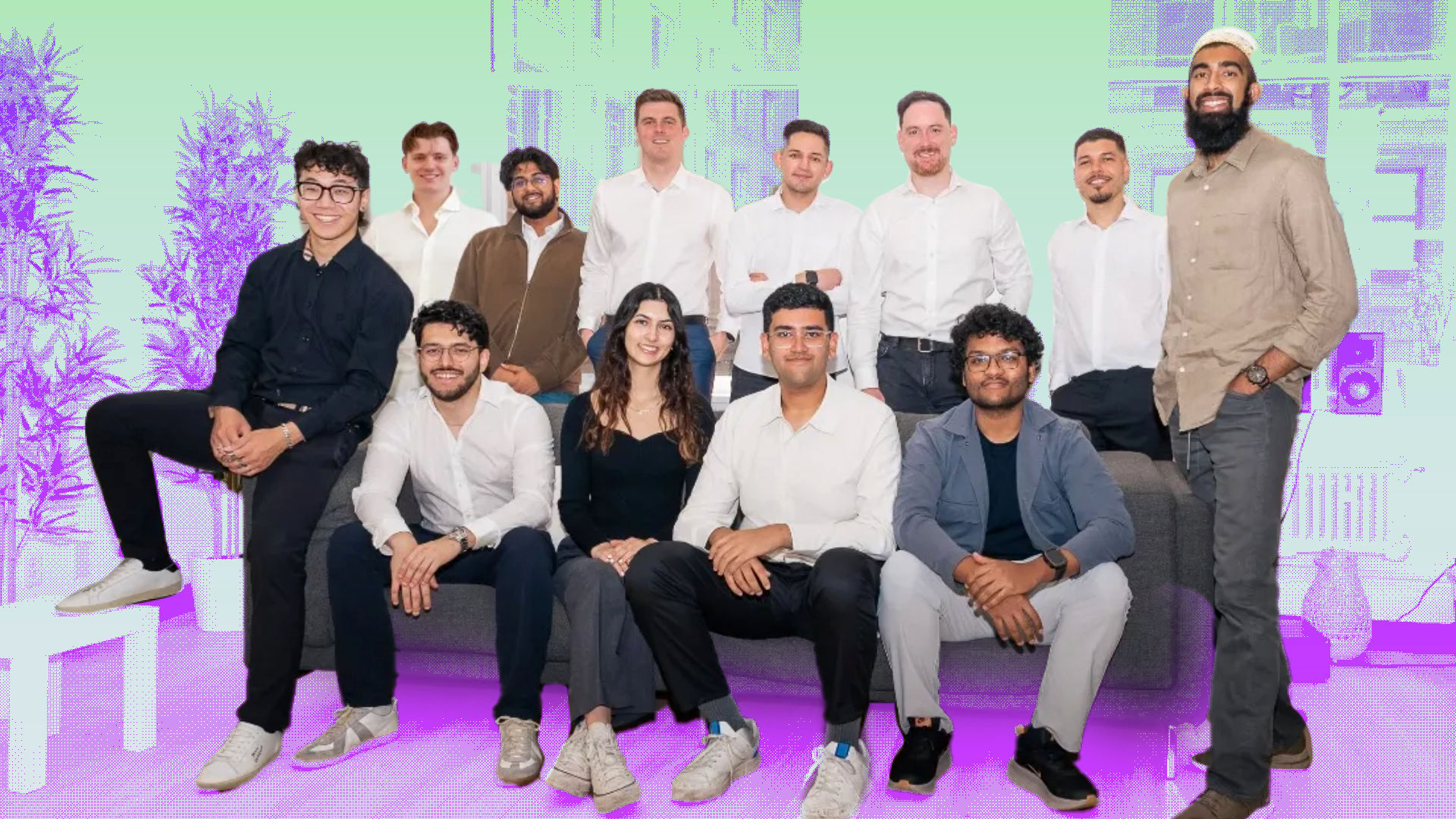- The Deep View
- Posts
- OpenAI and UK join forces to power AI growth
OpenAI and UK join forces to power AI growth

Welcome back. OpenAI CEO Sam Altman warns the world is heading for an AI "fraud crisis" because his technology has "fully defeated most of the ways that people authenticate currently, other than passwords." He's particularly alarmed that financial institutions still use voice authentication, which AI can now easily fake, and warned that video calls will soon be "indistinguishable from reality."
1. OpenAI and UK join forces to power AI growth
2. Alibaba’s new AI model takes the top spot in key scores
3. Young MIT dropouts land $300M valuation for compliance AI startup Delve
GOVERNMENT
OpenAI and UK join forces to power AI growth

The UK just handed OpenAI the keys to its digital future. In a partnership announced this week, the government will integrate OpenAI's models across various public services, including civil service operations and citizen-facing government tools. Sam Altman signed the deal alongside Peter Kyle, the UK's Science Secretary, as part of the government's AI Opportunities Action Plan. The partnership coincided with £14 billion in private sector investment commitments from tech companies, building on the government's own £2 billion commitment to become a global leader in AI by 2030.
The timing reveals deeper geopolitical calculations. The partnership comes weeks after Chinese startup DeepSeek rattled Silicon Valley by matching OpenAI's capabilities at a fraction of the cost, demonstrating that the US-China AI gap has heavily shortened. As Foreign Affairs recently noted, the struggle for AI supremacy has become "fundamentally a competition over whose vision of the world order will reign supreme."
The UK is positioning itself as America's most willing partner in this technological Cold War. While the EU pursues strict AI regulation through its AI Act, the UK has adopted a pro-innovation approach that prioritizes growth over guardrails. The government accepted all 50 recommendations from its January AI Opportunities Action Plan, including controversial proposals for AI Growth Zones and a sovereign AI function to partner directly with companies like OpenAI.
OpenAI has systematically courted governments through its "OpenAI for Countries" initiative, promising customized AI systems while advancing what CEO Altman calls "democratic AI." The company (as well as a few other AI labs) has already partnered with the US government through a $200 million Defense Department contract and also with national laboratories.
However, the UK partnership extends beyond previous agreements. OpenAI models now power "Humphrey," the civil service's internal assistant, and "Consult," a tool that processes public consultation responses. The company's AI agents help small businesses navigate government guidance and assist with everything from National Health Service (NHS) operations to policy analysis.
When a single American company's models underpin government chatbots, consultation tools and civil service operations, the line between public infrastructure and private technology blurs. The UK may believe proximity equals influence, but the relationship looks increasingly asymmetric.

The UK-OpenAI partnership, while non-binding and non-exclusive, reveals deeper strategic choices about Britain's technological future. Unlike formal vendor lock-in, the real risk lies in operational momentum—once thousands of civil servants are trained on OpenAI tools and government systems are optimized around them, switching becomes messy regardless of contract terms.
Britain is essentially outsourcing its AI learning curve to Silicon Valley. OpenAI is probably the right partner (they're the current leader), but this approach prioritizes immediate efficiency over building domestic capabilities.
The timing feels reactive rather than strategic. Just as DeepSeek showed that AI leadership can shift overnight, the UK doubles down on American tech dependence. The partnership will deliver real benefits, but it trades long-term strategic flexibility for short-term operational gains.
That might be the right bet. But it deserves more public debate than a Monday morning press release.
TOGETHER WITH ASTRONOMER
Want Better AI Outcomes? Fix Your Data First
Success with Generative AI starts with the health of your data.
Powerful deep learning models are becoming smarter, more accessible and cost-effective, but it’s only by combining these with rich proprietary datasets and operational data streams that organizations can build differentiated applications.
This whitepaper discusses the criticality of orchestrated data pipelines for the most common use cases in Generative AI, and provides an actionable plan for your team to get started today.
MODELS
Alibaba’s new AI model takes the top spot in key scores

Alibaba just released an AI model that can solve problems from the American Invitational Mathematics Examination better than most human math prodigies. Qwen3-235B-A22B-Instruct-2507 scored 70.3 on the prestigious competition, trouncing OpenAI's GPT-4o at 26.7 and DeepSeek-V3 at 46.6.
The timing amplifies China's recent AI momentum following DeepSeek's January breakthrough that sent Nvidia's stock tumbling. AIME problems demand sophisticated reasoning skills that separate elite high school mathematicians from their peers. Only about 5,000 students qualify annually from over 300,000 who take the preliminary exam.
The model's "non-thinking" approach makes its success more intriguing. Unlike OpenAI's o1 series, which shows step-by-step reasoning, Qwen3 generates final answers directly without revealing its thought process. This trades transparency for efficiency while hiding how it actually solves complex problems.
Beyond math prowess, Qwen3 delivers significant upgrades across multiple domains:
Scored 87.9 on MultiPL-E coding benchmark versus GPT-4o's 82.7
Context length expanded to 256,000 tokens, among the longest available
Enhanced multilingual capabilities and long-form reasoning
Improved alignment with subjective user intent and open-ended tasks
The model uses 235 billion total parameters with 22 billion activated per query.
Alibaba is positioning Qwen3 for immediate deployment through partnerships like HP's Xiaowei Hui assistant for Chinese PCs. The performance raises questions about whether Chinese AI development has moved beyond copying Western approaches toward genuine innovation, with Chinese competitors now setting the pace in specific technical domains.
TOGETHER WITH SALESFORCE
Here’s How To Scale Your Small Biz With AI
If you’re a small business owner, the idea of maximizing efficiency, reducing costs, and growing your operation probably sounds great – the only question is, how?
Well, we’ve got two words for you: AI agents.
Agentic AI is transforming small businesses like yours at hyperspeed, and Salesforce is here to show you exactly how with this free download. Inside, you’ll find everything you need to know about AI agents – including what high-impact areas they can assist with, how they can reduce costs, and how some of the most successful businesses are already using them to scale.
Ready to grow?
COMPLIANCE
Young MIT dropouts land $300M valuation for compliance AI startup Delve

Two MIT dropouts just closed a $32 million Series A, valuing their startup at $300 million. Delve's meteoric rise represents a 10x valuation jump since January.
Built after experiencing compliance headaches on a healthcare AI project, Delve uses AI agents to automate manual compliance work. The company now serves over 500 customers across frameworks like SOC 2, HIPAA and GDPR.
Insight Partners led the round with Fortune 500 CISOs participating. The timing aligns with the projected growth of compliance automation, which is expected to reach $76 billion by 2031.
Delve faces established competitors, including Vanta, valued at $2.45 billion, and Drata, which recently raised $100 million. The space has attracted significant venture interest as companies struggle to meet growing regulatory requirements.
Key metrics driving the valuation:
Customer base grew 5x from 100 to 500 companies in six months
Serves fast-growing AI startups, including Lovable, Bland, and Wispr Flow
Customers report unlocking millions in enterprise deals after compliance
Platform covers major frameworks: SOC 2, HIPAA, ISO 27001, GDPR, PCI DSS
The startup's customer growth, from 100 companies in January to 500 today, suggests a strong product-market fit. Customers report closing million-dollar deals after achieving compliance, though whether that translates to sustainable revenue remains to be seen.
The founders plan to expand beyond compliance into cybersecurity and risk management. With AI startups raising over $8 billion in 2024, compliance bottlenecks have become a common constraint on growth.
LINKS

72% of American teens have already tried AI companions
Alphabet tries to calm investor nerves as AI rivals ramp up pressure
Latent Labs brings protein design to the browser with new AI model
UK researcher heads U.S.-funded effort to model heart disease with AI
Google cracks down on how partners use machine learning in Ad Manager
Trump’s AI plan gains momentum with Oracle and OpenAI’s Stargate expansion

Pimeyes: Search the internet using a face photo to find matching images across public websites
Wordtune: AI writing assistant that rewrites sentences for clarity, tone, or conciseness across emails and documents
Genei: Automatically summarize background reading to produce blogs, articles and reports faster
Krea: AI design tool for marketers and creatives to generate high-concept visuals, product shots and social content in seconds

Hugging Face: Data Technical Architect, MongoDB
Mistral AI: Head of Developer Experience and Community
Anthropic: Research Engineer, Frontier Red Team (RSP Evaluations)
Character.AI: Machine Learning Infrastructure Engineer
A QUICK POLL BEFORE YOU GO
What’s your view on the UK’s decision? |
The Deep View is written by Faris Kojok, Chris Bibey and The Deep View crew. Please reply with any feedback.
Thanks for reading today’s edition of The Deep View! We’ll see you in the next one.

 | “The water drop in the [other] one looks hella unnatural.” “It seemed like the blur on the first one was too uniform. But truly, it was a guess. :-D” |
 | “Yeah I was thinking of going to the toilet and then I have to go to the cinema tomorrow ” “Both were believable. I liked the reflection in the water droplet, though it didn't show a camera.” |

Take The Deep View with you on the go! We’ve got exclusive, in-depth interviews for you on The Deep View: Conversations podcast every Tuesday morning.

If you want to get in front of an audience of 450,000+ developers, business leaders and tech enthusiasts, get in touch with us here.




